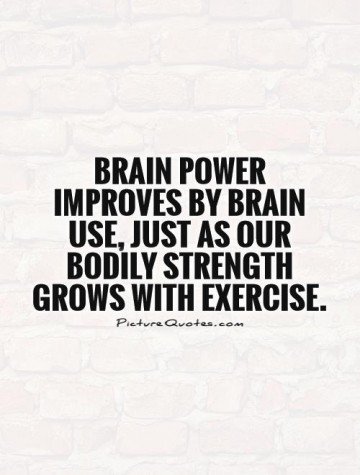
We all have a brain some have a good memory and some have a bad memory and we all want one thing to improve our brain day by day and scientist are working on that how to increase the power of brain and we can improve our brain quality with these tips
1-Playing Thinking Games:
.png)
Puzzles like Sudoku and crosswords may improve memory and delay brain decline, though experts are not yet sure why. "My guess is that playing them activates synapses in the whole brain, including the memory areas," says Marcel Danesi, PhD, author of Extreme Brain Workout. Research so far is decidedly mixed: Some studies have found that, while doing crossword puzzles may make you better at remembering the capital of Burkina Faso, there's little evidence they'll boost your performance at more general tasks, like remembering where your car is parked. But a 2011 study showed that participants who played a computer game called Double Decision for six years improved their concentration so much that they had a 50 percent lower rate of car accidents.
So I decided to try an online brain-training program called Lumosity, which neuroscientists from Harvard, Stanford and the University of California at Berkeley have used in their own studies; its creators claim that 97 percent of users improve their memory in just 10 hours of playing time. First I answered a series of questions at lumosity.com to identify which of my cognitive processes, including memory, could use a little help. Then I received a personalized training regimen. A 10-minute daily series of games is free, and a more advanced program is available for $12.95 a month. (Being cheap, I stuck with the former.) The games are pure funremembering a pattern of blocks, spotting a bird in a fieldand are based on what research has found to improve concentration and other cognitive skills
2-Your Diet:

According to Gary Small, MD, director of the UCLA Memory Clinic, memory superfoods include antioxidant-rich, colorful fruits and vegetables, which protect your brain from harmful free radicals. He's also enthusiastic about low-glycemic carbs, like oatmeal, and anything with omega-3 fatty acids. In fact, a recent study published in Neurology found that people with low levels of omega-3s had brains that appeared to be a full two years older in MRI scans. That was incentive enough for me to follow the memory-enhancing diet from Dr. Small's book The Memory Prescription, which claims it works in just two weeks. Much like the Mediterranean diet, it's heavy on produce, legumes, nuts and fish. It's low on meat, since meat's omega-6 fatty acids may contribute to brain inflammation, a possible underlying mechanism for Alzheimer's. Refined sugars produce a similar effect, so they were also out. (That was the toughest for me.) I ate a farmers market's worth of blueberries, spinach, avocado and beets, and consumed enough fish to sprout gills. I also went beyond Dr. Small's advice and took 2.4 micrograms of vitamin B12, the standard recommended daily amountsince studies show people with low levels perform poorly on memory testsand 1,000 international units of vitamin D, discovered by Tufts University researchers to boost cognitive function. (My doctor signed off on the supplements.)
3- Quit multitasking:
.jpg)
"One reason people can't remember where their keys are is they're not paying attention when they put them down," says Mark McDaniel, PhD, a psychology professor and memory researcher at Washington University in St. Louis. (His suggestion for always finding them: "When you put them down, stop and say out loud, 'I'm leaving my keys on my dresser,'" or wherever you're placing them.) Studies show that it takes eight seconds to fully commit a piece of information to memory, so concentrating on the task at hand is crucial. I willed myself to stop giving everything "continuous partial attention," a term coined by tech honcho Linda Stone. I put away my gadgets when they weren't absolutely needed. I didn't have 10 websites up all at once. I called a friend, sat on my bed, closed my eyes and actually listened to what she was saying.
4- Get more sleep:
.jpg)
Researchers at the University of Pennsylvania have discovered that losing half a night's restthree or four hourson just one evening can erode memory. And the journal Nature Neuroscience recently reported that one way to slow decline in aging adults is to improve the length and quality of sleep. During a deep sleep of eight hours or more, it's believed that the brain shifts memories from temporary to longer-term storage. Yet according to the Centers for Disease Control and Prevention, one third of us get less than seven hours a nightincluding me.
So, for more than a month, I implemented a stringent schedule: I would put my preschooler to bed and take a bath. Then I'd hit my own bed with a book, rather than watch TV or movies, which several studies reveal will make you feel too keyed up to wind down. Normally I fall asleep at 11:30 p.m. and wake at 5:45 a.m., but the new routine put me out by 10.
**Alot of other method but i cant explain these are basic which we need a lot in our life to improve our health and brain
Hi! I am a robot. I just upvoted you! I found similar content that readers might be interested in:
http://time.com/52237/7-tricks-to-improve-your-memory/